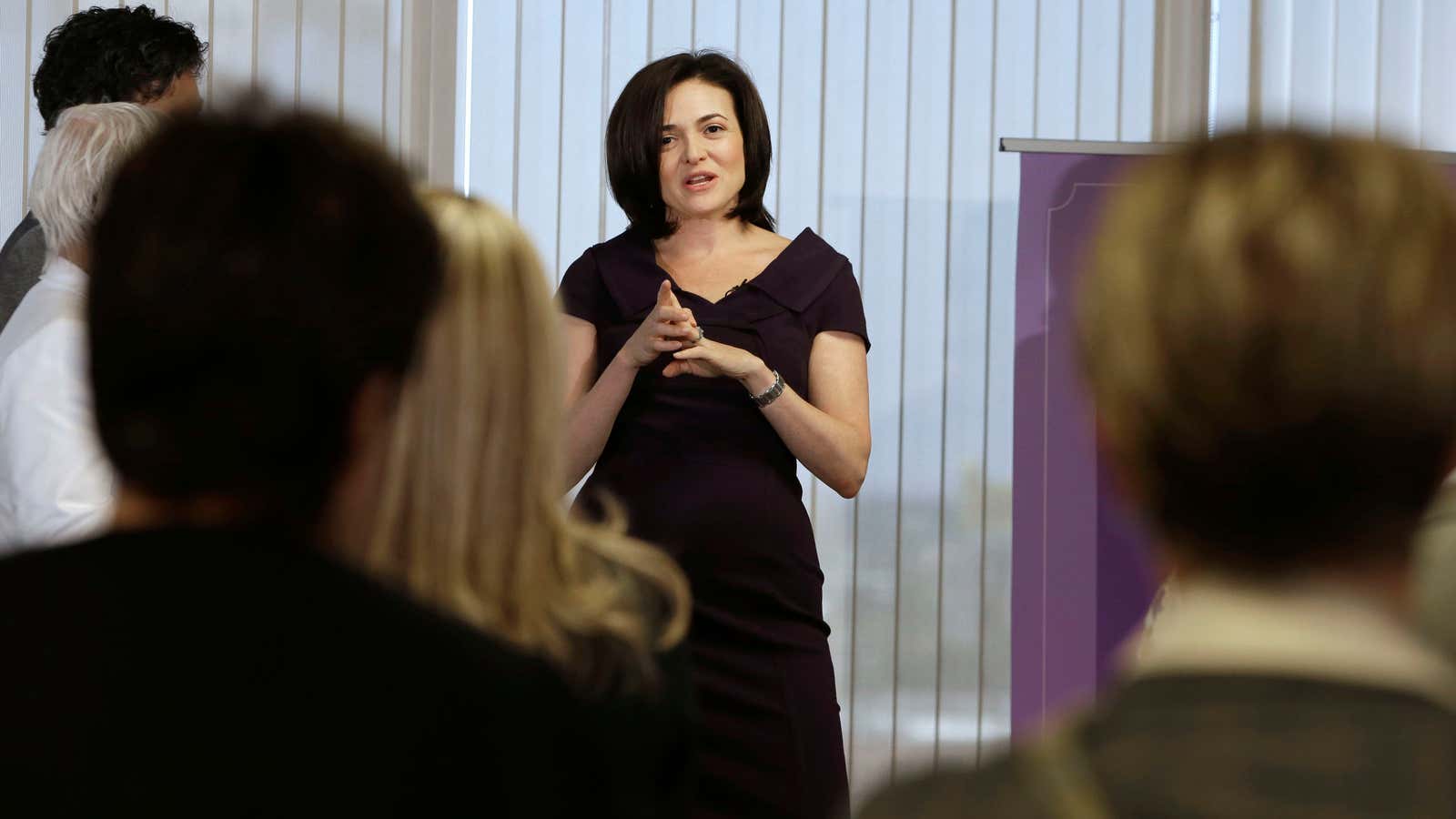McKinsey & Company’s most recent report on gender equality in the workplace, released in collaboration with Sheryl Sandberg’s LeanIn.Org, is chock-a-block with the expected findings: Women don’t get promoted as often as men. They negotiate for raises as often as their male counterparts, but are more likely to be called “aggressive” or “bossy” for doing so. They have less access to senior leadership. Progress notwithstanding, women in the corporate landscape are still underrepresented at every level.
But the report’s most surprising finding has to do with female ambition. For all of the focus on breaking glass ceilings, a notable percentage of women surveyed were less interested than men in becoming top executives. According to the study, which drew on data from 132 US companies employing more than 4.6 million people, only 40% of women actually want senior leadership positions, compared with 56% of men.
This conclusion isn’t unprecedented: Only one in five senior executives is female, and both Bloomberg and Harvard Business Review have cited research showing women are less interested than men in getting the top job. That’s true for for both mothers and women without children, which means the issue goes far beyond maternity leave and flexible policies for working moms. Equally unlikely is the notion that women are simply intrinsically less interested in leadership.
In a man’s world, women have come to associate the acquisition of power with added stress, burden, and conflict. Their experiences at work gradually lead them to believe they won’t have equal opportunities for growth and development, and that their gender will diminish their chances of getting ahead. Those accumulated years of inequities and frustrations have led many to conclude that the end isn’t justified by the means. As McKinsey puts it, women “expect to face more challenges or are doing a different cost-benefit analysis.”
Even those who are still intent on climbing the corporate ladder—in the face of all attempts to subtly discourage them—are less confident that they’ll get there, or that they’ll be able to effect change once they do. The study found that women are also less likely than men to think that becoming a top executive will give them a chance to significantly impact the business.
Action items
More companies than ever before are enthusiastically declaring their commitment to gender diversity, but McKinsey’s findings clarify deep-seated limitations that make it difficult to translate words into practice. Getting women into the C-suite means more than making the workplace less hostile; it means actively fostering women’s ambition—something we’ve traditionally been reluctant to do.
Jodi Detjens, a management professor at Suffolk University, says there needs to be a bigger focus on confronting women’s internal biases about themselves, not just the external barriers they face—a key point in Sandberg’s 2013 book, Lean In. Detjens’ research points to three unconscious assumptions that underlie the ambition gap. Women tend to believe they’re the ones responsible for managing all aspects of family life, which keeps them from investing fully in their careers. They also assume they should keep their heads down and focus exclusively on their immediate work, which can make management roles seem less appealing. Finally, women are often perfectionists. A 2014 Hewlett-Packard study found that men will apply for a job they feel 60% qualified for, while women hold out for 100%.
“It’s not an ambition gap but a perspective gap,” Detjens says. Women need to reframe their own unconscious biases—an exercise made easier by having strong female colleagues.
Anne-Marie Slaughter, president of the New America Foundation and the author of Unfinished Business, suggests women also conceive of power differently. Slaughter says there are two basic positions of power—the top of a hierarchy or the center of a web—and women are often drawn to the latter. It’s a trend she first noticed at Harvard Law, where her most talented female friends didn’t go out for the Law Review because they “did not want to concentrate all their energies on one thing, no matter how prestigious.” Instead, they opted for a more diffuse impact, working in clinics or other law reviews.
“Women may well often see themselves having more impact at the center of a web,” Slaughter says. “[They] have not been at the top enough to understand the kind of power they can wield and impact they can have if they are free to make the changes they really want to make.”
